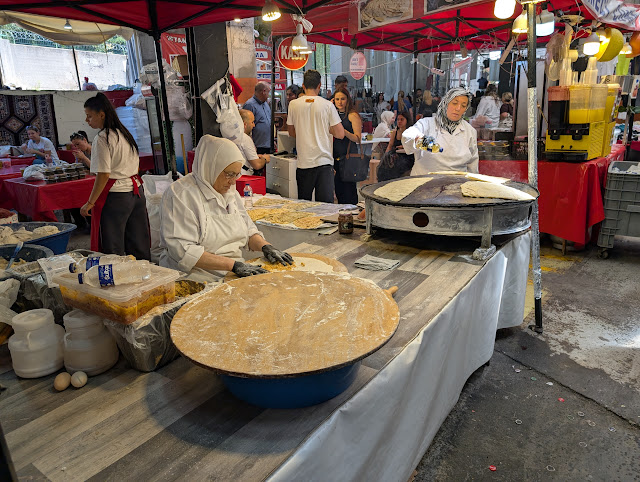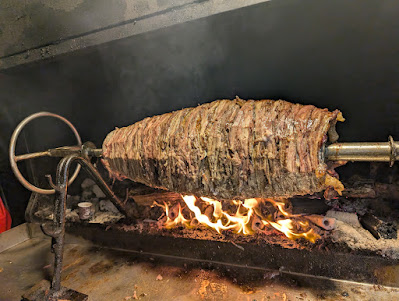 |
| Anatolian gözelme grannies at the Bakirköy Market |
This blog began in 2006 as a newsletter to friends and family about our time in Istanbul. Fumie was working for an travel guidebook which let us spend several months living in the Galata neighborhood of Beyoglu, enough time for us to feel at home in the city and for me to pick up enough Turkish to make basic conversation. Looking through those first blog posts I am still shocked at how affordable Istanbul was. Lunch could be had for a dollar, and three dollars got you a full meal served on a tablecloth.
That is no longer the situation. The Turkish economy is in crisis, and inflation has raised Turkish prices. Not prohibitively expensive for the traveler, but for Turkish citizens the cost of living has exploded. For Turks, a generation of dreams has collapsed.
Istanbullites eat out a lot, and they have ever since it was Byzantium. Its a big city and people can't go home for lunch. People pick up a bite for breakfast on the way to work, and tradesmen's cafes - called Esnaf Lokanta - serve cheap, filling lunches during the day. Snacking is considered a basic right to all Turks, but that döner kebab that was a dollar back in 2006 can now hit eight dollars and up, while the average Turkish wage is basically the same as it was years ago. If you read history, going all the way back to the Byzantines, Istanbul has always been a poster child for urban economic problems. Istanbullites are tough and cynical about it. Hell, they survived the Fourth Crusade, they can survive this.

The explanation for what brought the Turkish economy to this sorry state lies with the increasingly undemocratic rule of
President Recep Tayyip Erdogan. Like his close friend Viktor Orban in Hungary, Erdogan runs a
performative democracy in which processes like elections are held giving the appearance of democracy, but without the mechanisms - free expression, free press, civil society - that feed a democratic process. Erdogan, like Orban, has zero patience for political rivals - last May Erdogan had Istanbul
Mayor Ekrem Imamoglu arrested on hazy charges of corruption, sparking mass demonstrations leading to riots. Whatever can be said of Erdogan, however, he is
not an economist. Playing to a religious conservatism that runs contrary to the secular traditions of Kemal Ataturk, Erdogan promoted the idea that banking interest is "un-Islamic" and during his time in office he has repeatedly fired the heads of the Turkish national bank, each firing lowering confidence among foreign investors on which Turkey depends.
This video (by a former CNN reporter) does a pretty good job of explaining what happened to the Turkish lira in the last few years and how it affects travellers..
 |
| Bakirköy Pazar |
The resulting economic turmoil led Turkey to an 83% inflation rate in 2022, which hit Turks where it hurts: in the stomach. Today the inflation rate still stands at around 35%. Given the government controls on free press (there are a lot of Turkish journalists in prison) the Turkish general populace takes to social media to express itself. My Instagram feed is full of examples of Turkish meat porn, a wide ranging genre featuring smiling Anatolian chefs offering mounds of steaming, juicy sliced meat to the camera lens. Some of my favorite Turkish cooking videos are the ones where big muscled guys with moustaches work up a few kilos of lamb in the back room of a butcher shop, grill up the results and stand around tasting the results like satisfied wine experts discussing a vintage. And people can express themselves freely about the price of food.
 |
| House made döner at Abdulkadir in Bakirköy : 80% veal, 20% lamb |
What I have noticed is that more and more Turkish food videos are focused on cheaper foods that can be had in local grocery stores: grilled cheese sandwiches, chick peas wrapped in flatbread, foods sold from street carts like the ubiquitous chicken, chickpea and rice or gözelme pancakes. Comments on the clips are largely shock about prices, especially for common lunch items like köfte kebab and döner. Meat has gotten pricey. A downtown döner kebab lunch can be as much as a full service pit roast lamb dinner in the Kadinlar Pazar. Carefully choosing can keep costs down.
 |
| Cheap and filling: Beans over chicken and pilav |
For a tourist, Istanbul can still be negotiated on a budget. We no longer choose to stay near the downtown. We took advantage of the Turkish Airlines stopover program, which offers a night free in a five star hotel if your flight connects in Istanbul - two nights if you a flying from a long distance (like the USA). We added two extra nights to that by contacting the hotel directly, and got a 50% reduced rate for two extra nights. Our neighborhood - Bakirköy on the sea just outside the old city walls - was a normal part of Istanbul. No tourists, a few universities, a busy shopping district, malls, mosques, and a stop on the new Marmaray train line to downtown Istanbul.

As you wander north of the Marmaray rail station towards Incirli you hit the Bakirkoy Market on Thursday and Saturdays. Municipal Bazaars like this operate all over Istanbul on different days of the week: this is how Istanbullites deal with the economy. Home goods, clothing, second hand tools, its all here for a song. Crowds gobble down gözelme Anatolian pancakes stuffed with meat, spinach, or cheese, made in front of you by real Turkish grandmas for 70 Turkish lira (about $1.75) Among the things that followed us home was an entirely affordable modern Afghan kilim rug. A similar piece downtown cost 100% more.

The nearby neighborhoods of Incirli and Gungören are known locally as "Little Gaziantep" - home to a Anatolian internal immigrants from the Gaziantep region in southern part of Turkey, a region known for its uncompromising traditional cuisine. Yes, we took advantage. Antep cooking is militantly conservative: bread must be fresh, kebabs must be just so, and dessert must be like grandma used to make.
 |
| In "Little Gaziantep" |
For our first night in Bakirköy, after a ten hour flight and an hour taxi ride from Istanbul Airport, we already knew where we were having dinner: Çevre İskender Kebap Lahmacun Salon a small all night kebab place a few blocks away from our hotel. We have been there before. Pure Gaziantep style kebab, with a big wooden oven churning out fresh lavash bread and lahmacun to order. Fumie had the classic ground meat Adana kebab, I had kanatler - simple grilled wings, crunchy and perfectly finished by one of those moustached meat masters of southern Turkey. The night before we left we returned for another Antep specialty that I have been wanting to try for years: katmer.

.
 |
| The meat, she sings! |
Turkey is home to several million refugees of the Syrian civil wars. A large Syrian neighborhood coalesced in the conservative Muslim neighborhood west of Aksaray station in Fatih district. We went there one very hot Saturday day to visit the huge Findikzade market. Down the block was something I was curious about: real Syrian falafel. Falafel isn't a Turkish dish, and until the Syrians arrived it was virtually unknown. Most of us know falafel from its Israeli version, translated through trendy vegan recipes and commodified as a fast food. The falafel I had at Tayba Falafel next to Haseki tram station was an eye opener.  |
| Syrian falaful in Fatih |
It was lighter, crunchier, lighter and less heavily spiced than most snack stand falafels I have eaten. The Syrian Hummus was creamy smooth with whole chickpeas sitting on top, the taboon bread was hot and fresh. It was wonderful, just the thing for a hot day. Fumie went for the lahmacun, which was spiced with mint and served inside a wrap of flat taboon bread, sort of a bread on bread sandwich, but stıll good.
 |
| At Yesilköy beach. The 1877 treaty that ended the Russo-turkish war was signed here! |
People may ask me if Turkey ıs still worth visiting and my answer ıs a wholehearted yes. Yes, it has social and economic upheavals due to a megalomaniac Leader figure - but then again, I live in Hungary and just visited the USA, so I am familiar with that form of social misery already. But careful planning can keep your budget intact, and nobody should pass up the chance to experience the openness and overwhelming grace and friendliness of the Turkish people. You don't return to Turkey for the food, or the rugs, or the beaches. You go for the people.














No comments:
Post a Comment